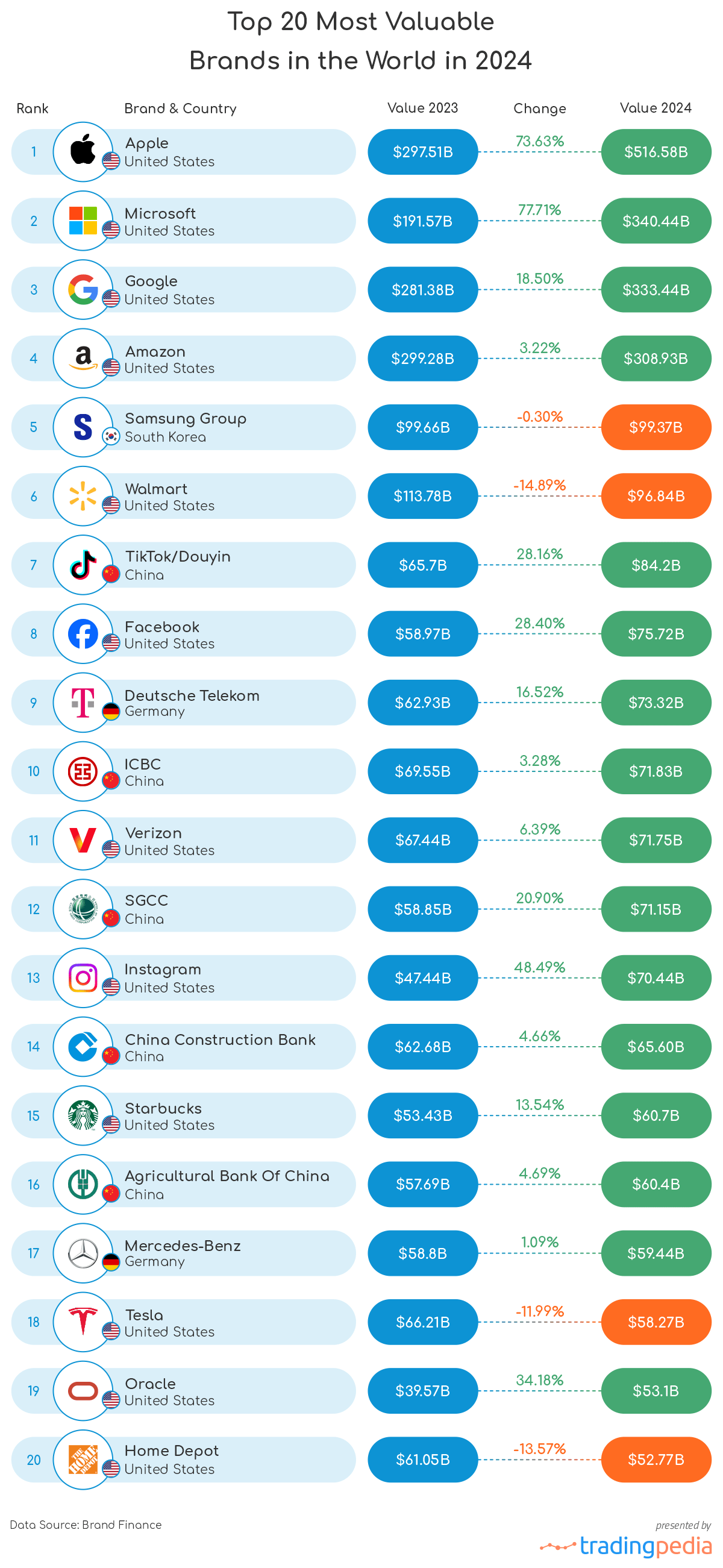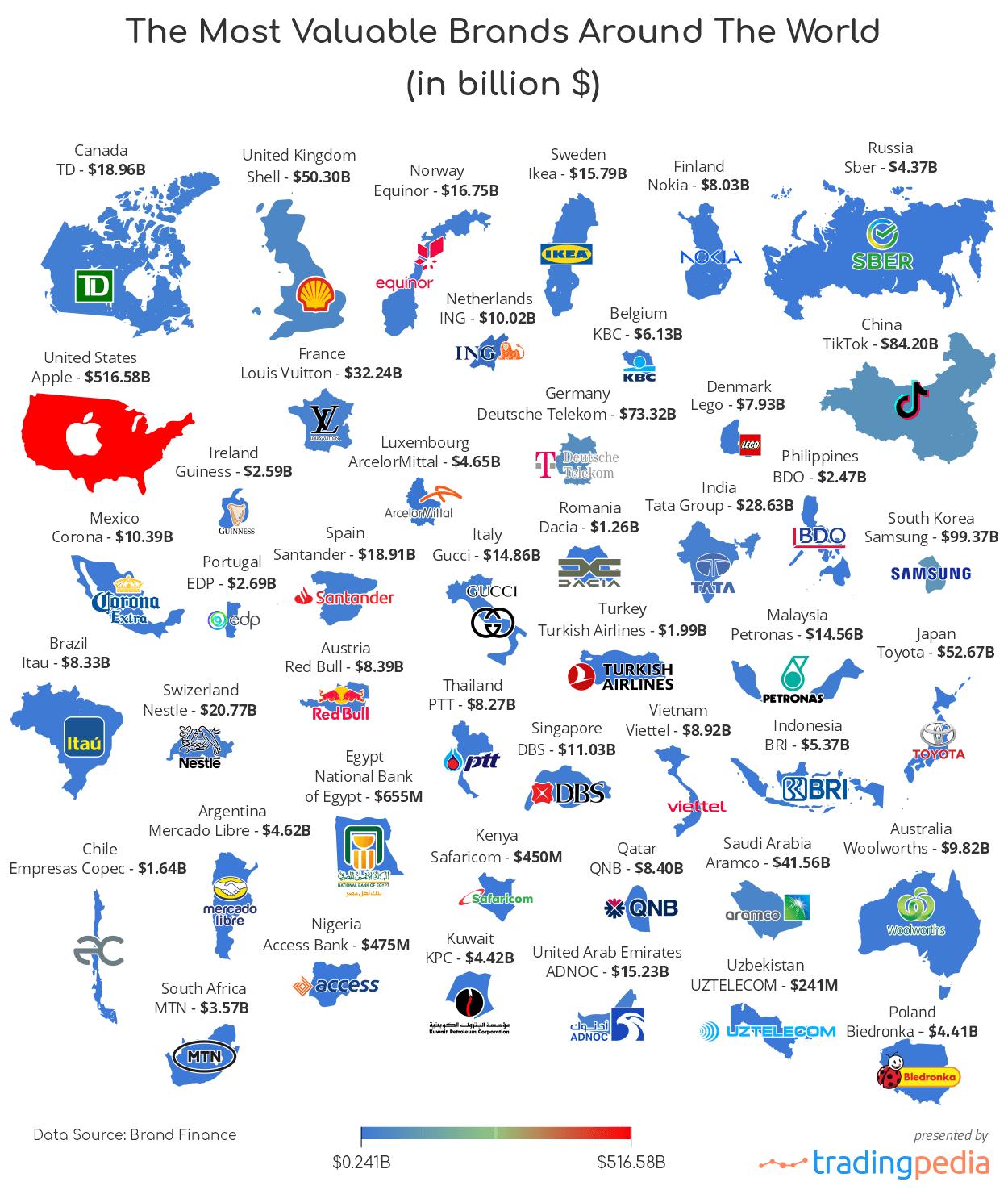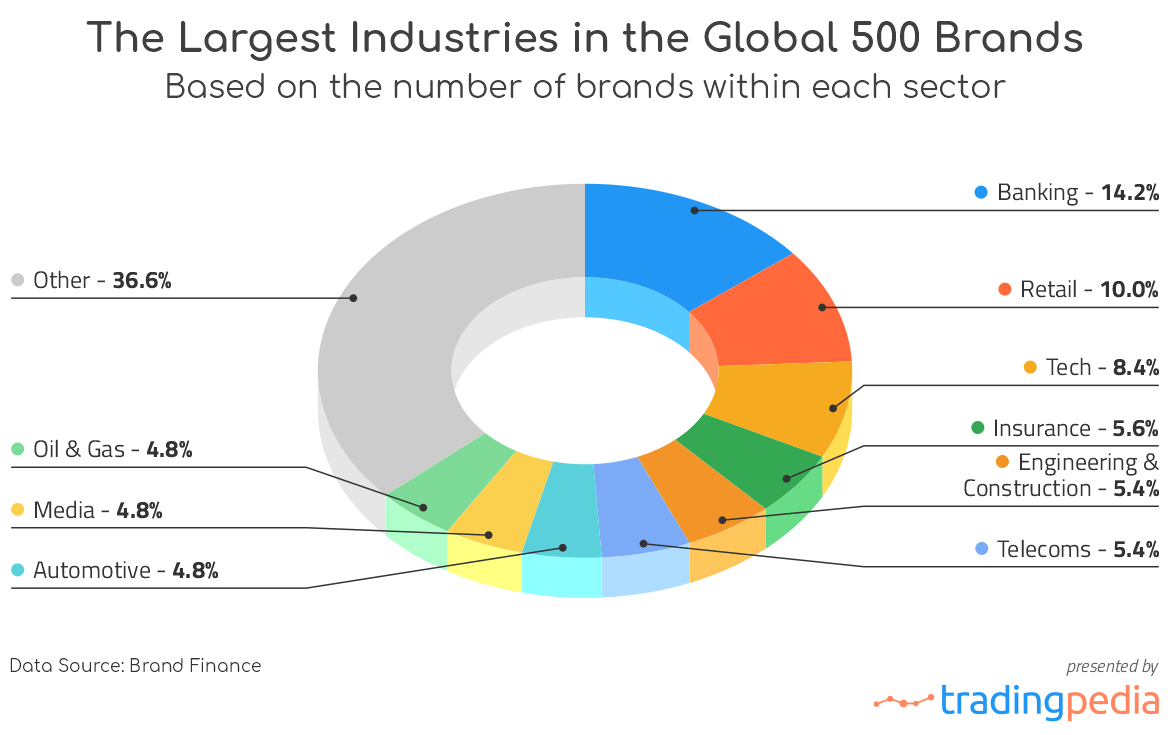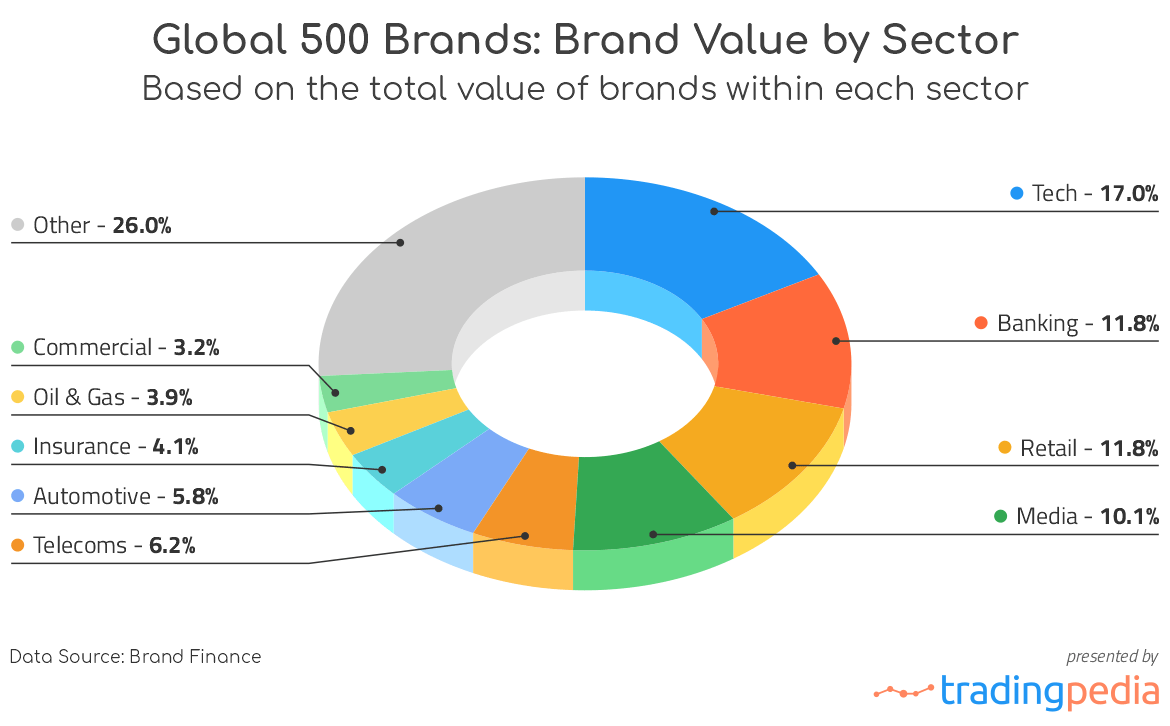At TradingPedia, we’re excited to present our latest report, which delves into the world of brand valuation and reveals the most valuable brands globally in 2024. Our comprehensive analysis explores the top brands by value in 45 countries, providing a unique insight into the global brand landscape.
Using Brand Finance’s Royalty Relief method, we’ve estimated the value of each brand, taking into account the expected financial returns over its useful life, discounted for market uncertainty and specific asset risks. Our research highlights the dominance of US brands, with Apple, Microsoft, and Google leading the pack, while also showcasing the rise of Asian brands, such as Samsung and TikTok.
In this report, we’ll take you on a journey through the world’s most valuable brands, industry by industry, and country by country. From the tech giants of Silicon Valley to the fashion powerhouses of Europe, we’ll explore the trends, insights, and surprises that shape the global brand landscape.

The Biggest Brands Around the World in 2024
The world’s most valuable brand for 2024 began its journey in 1976 at a home on Crist Drive in Los Altos, California. This marked the start of what would become one of the most influential technology companies globally. Initially focused on personal computers, Apple’s innovative approach paved the way for groundbreaking products that revolutionised multiple industries over the years.
Apple Inc. is currently the most valuable brand in the world, with an estimated value of $516.58 billion. This marks a significant increase from last year, when it was valued at $297.51 billion, representing a growth of 73.63%. Apple surpassed the previous year’s leader, Amazon, which experienced only a 3.22% increase, and now its brand is valued at $308.93 billion, ranking 4th globally. Microsoft and Google take the second and third positions, with brands worth $340.44 billion and $333.44 billion, respectively.
Walmart experienced a significant decline of 14.89% in 2024. As a result, Samsung Group moved up to the 5th position, despite also facing a slight decrease in its value. Samsung’s loss was minimal, only 0.3%, bringing its total value down to $99.37 billion. In contrast, Walmart lost $16.939 billion of its value, leaving it at $96.842 billion and in 6th position.
The Chinese social media platform TikTok/Douyin, with $84.199 billion in brand value, and Meta’s Facebook, worth $75.716 billion, are in the 7th and 8th positions. This year, Germany’s Deutsche Telekom entered the top 10 in 9th place with a $10.393 billion increase compared to the year before, currently valued at $73.321 billion. The Chinese multinational banking and financial services corporation ICBC ranks 10th, with a slight lead of $74 million over the former 10th, Verizon. This year, ICBC is valued at $71.828 billion, a 3.28% increase compared to last year.
The Most Valuable Brand in Every Country
Many major brands are concentrated in just a few countries, particularly China and the United States. However, regardless of the company’s size, each country has its leading brand. We researched the most valuable brand for each country on our list and found the following results.

Six U.S. brands are featured in the top 10 list, with four leading the ranking. All four leaders are in the tech industry and are collectively valued at $1.499 trillion. Apple, the world’s top brand in 2024, has seen exceptional progress, with a brand value rising 73% from last year. Microsoft takes the second position, while Google ranks 3rd for the second consecutive year, showing sustainable growth of $52.059 billion. In fact, the tech sector seems to be driving the success of U.S. brands, as nearly 23% of the combined value of all American companies in the top 500 comes from just 52 tech businesses.
Among them is NVIDIA, which is the fastest-growing brand in the United States, growing roughly 163% from last year. The other impressive American brand is Charles Schwabb, the financial services company, which managed to climb 289 positions to the current 171st place. Overall, American brands make up more than half (52.76%) of the top 500 ranking and the top 100 brands, where 52 U.S. brands are dominating.
South Korea’s Samsung Group is the world’s most valuable non-U.S. brand in 2024. Despite a decrease of $511 million over the past 12 months, Samsung retains its top position in South Korea, with a brand value of $82.211 billion. In second place is the car manufacturer Hyundai, which grew 44.6% year-over-year to $22.942 billion. The South Korean chipmaker SK Hynix ($10.015 billion) and the electronics company LG ($9.841 billion) swapped places; meanwhile, Kia remains in its previous position with a brand value of $9.040 billion.
China’s most valuable 2023 brand, ICBC, has dropped to the second position, surpassed by the social media platform TikTok. ICBC, the state-owned commercial bank, is valued at $71.828 billion, experiencing only a $2.28 billion change in value. In contrast, TikTok has seen its value rise by $18.5 billion over the past year, reaching $84.199 billion. Following these two, the State Grid Corporation of China ranks third with a value of $71.145 billion. China Construction Bank and the Agricultural Bank of China are ranked fourth and fifth, with values of $65.604 billion and $60.398 billion, respectively.
Worth $73.321 billion, Deutsche Telekom is Germany’s top brand by value and it ranks 9th on the list of the global top 10. It is valued at, with an increase of $10.393 billion compared to last year, allowing it to maintain the top position for another consecutive year. Car giant Mercedes-Benz ranks second in Germany with a value of $59.436 billion. Despite shedding nearly $1.5 billion, the multinational financial services company Allianz Group retains its 3rd 3rd place with a value of $46.889 billion. Two automotive companies follow in Germany’s ranking; after swapping places from last year, Porsche and BMW now rank 4th and 5th with values of $43.117 billion and $40.987 billion, respectively.
British oil and gas giant Shell holds the title of the most valuable brand in the United Kingdom, with an estimated value of $50.302 billion, up $2.093 billion from the previous year. UK’s other top brands are professional services company Ernst & Young or just EY ($30.845 billion), PwC ($24.672 billion) and HSBC, which maintains its position with a value of $20.047 billion in 2024. British Petroleum, now known as BP, has climbed one position to the 5th place in the UK and 104th globally with a value of $18.533 billion.
It is also interesting to see the top brands in terms of value in other parts of the world. In the Netherlands, the leading brand is the banking and financial services corporation ING, valued at $10.017 billion. In France, the top brand is fashion giant Louis Vuitton, with $32.235 billion. In Sweden, IKEA remains the most valuable brand, despite losing some of its value in 2024 (down 0.9% to $15.786 billion). Interestingly, Volvo is now 33.5% more valuable as a brand compared to last year, reaching $11.128 billion.
In Canada, TD Bank continues to hold the first position, although it faces a loss of $1.4 billion. Brazil’s most valuable brand is banking giant Itau, valued at $8.334 billion in 2024. Meanwhile, Woolworths, a retail and financial services operator, remains the largest brand in Australia. It is also the largest company in the country in terms of revenue and employee count, although it experienced a slight decrease in value to $9.820 billion.
Not every country can create a major brand, as larger economies often have an advantage. However, brands can emerge from all around the world, and sometimes, smaller economies manage to produce some of the most recognisable brands. Two notable examples are Finland, known for its Nokia phones, and Mexico, famous for its Corona beer, which rose to the world’s most valuable beer brand in 2024. Following a 40% increase in brand value, it surpassed Heineken and is now worth $10.4 billion.
Brands with the Most Impressive Growth in 2024
We found some interesting changes among companies over the past year. Notably, the most impressive rise among the world’s top 100 brands belongs to NVIDIA, which ranks 30th in 2024. Just 12 months prior, the chip manufacturer was in 117th place with a valuation of $16.922 billion. NVIDIA’s value has surged to $44.488 billion, reflecting an impressive 162.90% increase. Its investment grade improved to AAA-, which means it achieved strong creditworthiness and a low risk of default within a year. The American tech company Oracle moved up 16 positions to rank 19. Its investment grade also rose, going from AA+ to AAA-, with a brand value of $53.099 billion. The social media platform Instagram and the health insurance company UnitedHealthcare also showed a significant rise, climbing up 13 and 11 positions, respectively.
The Chinese battery maker CATL climbed 36 spots to rank 99, with a small positive change in its rating. Humana, an American health insurance company, saw a rise of 32 positions, increasing its brand value to $20.963 billion. The French fashion giant Louis Vuitton kept 1st place in France and gained 18 positions globally. While its investment grade stayed the same, its value increased by $5.945 billion to $32.235 billion in 2024.
The German multinational company SAP experienced a significant increase, rising 14 positions since last year with a growth of $4.069 billion in brand value. In a similar upward trend, the food and beverage corporation PepsiCo moved up 12 positions, while the multinational telecom company Orange advanced 11 positions. Currently, PepsiCo’s brand value stands at $20.209 billion, while Orange’s brand value is slightly higher at $20.276 billion. However, they differ in their investment ratings, with PepsiCo holding an AAA- rating and Orange an AA+.
It’s worth noting that not all companies showed positive changes. The multinational automotive company Tesla fell 9 positions and lost $7.935 billion or -11.99% in value, with a current evaluation of $58.272 billion. The accounting company PwC dropped 7 positions, and its value decreased by -2.61%, estimated at $24.671 billion. The American home improvement retailer Home Depot dropped 7 positions and lost $8.285 billion in value. The German automobile company Volkswagen lost two positions and approximately $167 million; however, its rating improved to AAA- from last year’s AA+. The Japanese automotive manufacturer Toyota also dropped two positions, but its rating remained unchanged and currently ranks 21st.
The Biggest Industries
If you’re curious about which industries perform best in global rankings, here are the figures regarding the percentage share of the top 500 brands.

The banking industry clearly dominates the list of top global brands when considering the number of brands in each sector. Approximately 14.2% of all brands in the top 500 are banking and financial services companies, while 10% are in the retail sector. Technology, engineering and construction, and telecommunications are also significant industries. However, technology and retail lead the way in terms of total value. Technology brands account for 17.04% of the total value of the top 500 companies, while retail brands contribute 11.75%.

Methodology
Several reputable publications, including Forbes and Brand Finance, release annual brand rankings. Each publication uses its own methodology to assess the value of a company or brand. For this visualisation, we focused on Brand Finance, which employs an interesting approach known as the Royalty Relief method. Essentially, Brand Finance estimates the amount a company would be willing to pay to license its brand as if it did not own it.
Our research was based on Brand Finance’s annual report on the top 500 global brands, along with numerous country- and industry-specific reports available on its Brandirectory website. We compiled all the data they provided and analysed it to identify:
- Every country represented in the top 500
- The top three brands for each country in the top 500 (when applicable)
- Every country in the top 100
- For each country in the top 100 brands list, the total number of brands present in the top 100 ranking (if any)
